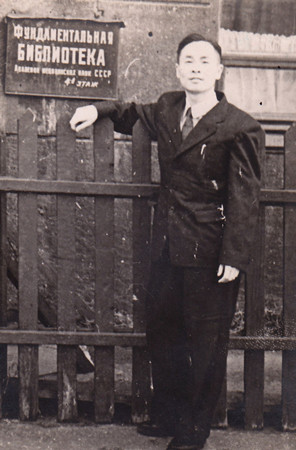
Hou at the Ivanovski Institute of Virology in Moscow in 1958. (Photo/CHINA DAILY)
Medical genius
Hou had a tough childhood, because he grew up during the War of Resistance Against Japanese Aggression (1931-45), and when he was about age 10, his older brother died of an unidentified illness. The loss cemented Hou's determination to become a doctor.
In 1955, after graduating from Tongji Medical College in Shanghai, the nation's top medical school, Hou started out on a lifelong path of researching countless viruses and diseases.
At the time, bubonic plague, cholera and smallpox were rampant in China, but many medical professionals lacked the knowledge or equipment to help.
To remedy the shortfall in his education, Hou studied at the Ivanovski Institute of Virology in Moscow from 1958 to 1962, intending to return to China and use his knowledge to benefit the country.
The Soviet Union was a scientific powerhouse at the time, and its academics generally had a poor opinion of students from overseas. As a result, foreign students were only awarded Candidate of Sciences degrees, a lesser qualification than a full medical degree, even though they completed the entire course.
When Hou arrived at the Soviet lab, he faced an immediate challenge-most of the lab mice had died and nobody knew why. By closely observing the symptoms displayed by those still alive, Hou realized they had contracted the Sendai virus, a highly transmissible infection that originated in Japan. His colleagues later confirmed Hou's hypothesis and solved the problem by closing the lab and conducting an intensive cleanup operation.
"Immediately identifying the right virus is the first and most important step in any prevention effort. This works for humans and mice alike," Hou said later.
The incident made Hou famous at the institute. His Soviet colleagues often said "ask the Chinese" when fellow scientists experienced problems with their research. Editors of virology journals also approached Hou because he frequently published high-quality academic papers.
At the end of his time in the Soviet Union, Hou made history by being awarded a full medical degree, the first time the institute had granted the qualification to a foreign student.


















































